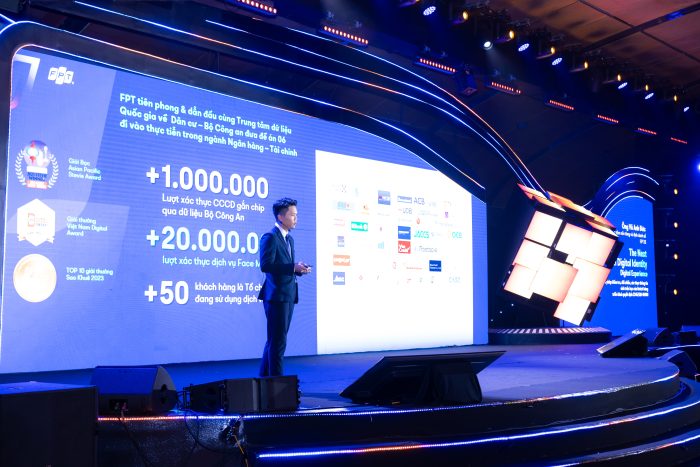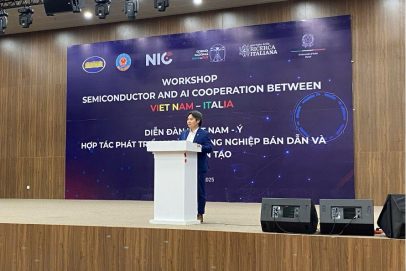FPT IS expert: Technology will be the “shield” protecting users in the digital payment era
At the 2024 Digital Transformation Day of the Banking Sector, an FPT IS expert gave comprehensive presentations on authenticating identity, given the rapidly rising trend of online frauds.
The application of “facial recognition biometrics” will be a shield to protect users in the digital payment era, and lay the foundation for the banking sector to implement Decision 2345/QD-NHNN.
The potential of the online payment sector is directly proportional to cybersecurity threats
Vietnam’s economy, which is among the fastest-growing in the region, has great potential for the explosive expansion of electronic payments. According to the data from the State Bank of Vietnam (SBV), as of the end of 2023, the number of individual payment accounts was more than 182.88 million, an increase of 21.8% over the same period in 2022. Non-cash payment indicators achieved a high growth rate.
In addition to the huge potential for growth, the global and Vietnamese cyber security environments are growing more complicated, and the number of criminals utilizing cyberspace for theft and fraud is rising. The finance and banking industry is always the top target for cybercriminals using high technology.
At the 2024 Digital Transformation Day of the Banking Sector, Mr. Vu Anh Duc – Deputy Director of the Digital Identity Platform Center, FPT IS gave an analysis: “Vietnam has recently recorded two main types of fraud, including: fraud to steal personal information (accounting for 24.4%) and financial fraud (accounting for 75.6%)”.
Mr. Vu Anh Duc – Deputy Director of the Digital Identity Platform Center, FPT IS spoke at the event.
One of the main causes is ineffective KYC (Know Your Customer), which increases the risk of financial crimes to scam money through dummy accounts. Therefore, in order to enhance safe and secure online payments and bankcard payments, on December 18, 2023, the SBV issued Decision No. 2345/QD-NHNN on the implementation of measures to ensure safe and sound online payments and bankcard payments.
In this decision, the SBV requires credit institutions to apply biometric identification measures, including: face, palm-vein, palm-print, fingerprint, iris, voice, or others, for certain types of online transactions.
“However, following the implementation of Decision No. 2345 on July 1, which biometric identification measures will be selected? What is the best solution for that problem?”, Mr. Duc asked.
The payment authentication process takes only one second with technology
At the event, the FPT IS expert proposed that banks and credit institutions choose facial recognition biometrics as the identification measure.
The application of facial biometric identification will solve some key problems. Firstly, it actively promotes the use of data stored in the chip of the citizen identification (ID) card under Project 06, which not only updates and clarifies current customer data but also offers nearly perfect effectiveness against counterfeiting. Secondly, it ensures convenient implementation and faster processing. Thirdly, it requires a small investment in devices with simple cameras. Finally, it facilitates flexible platform integration, serving different banking functions.
Understanding the urgent need, FPT IS made early and significant investments in facial deepfake protection technologies such as capturing images and videos from other devices, deploying simulation software or face-merging using AI, and so on. In light of this, FPT IS achieved ISO 30107-3 standard for biometric presentation attack detection in 2022.
The FPT IS expert affirmed that “facial biometric data” would be a shield to protect users making digital payments.
Furthermore, FPT IS was honored to be trusted and given significant assignments by the Research and Application Center for Residents Data (RAR) in particular and the Ministry of Public Security in general in implementing chip-embedded citizen ID card authentication, fulfilling Project 06 requirements. The solution is perfected with the most advanced technologies in identity authentication.
To achieve identification accuracy of up to 100%, in addition to having access to the Ministry of Public Security’s chip-embedded citizen ID card authentication, FPT.IDCheck also integrates the most advanced technologies, such as: AI-based anti-spoofing detection technology meeting international standards (ISO-30107); OCR technology to extract data from both sides of the ID cards that automatically reads and analyzes the MRZ string; Near field communication (NFC) technology that reads data from the chip-embedded citizen ID cards according to the ICAO 9303 standard, and so on.
“Our technology compares two faces with confidence in less than 0.1 seconds. It can also locate a face out of 10 million faces in less than a second by employing algorithms that have been tried and validated in real-world scenarios. Consumer trust is the proof of our successful solutions. In just one year of implementation, we have successfully authenticated over one million chip-embedded citizen ID cards, processed over 20 million face matching cases, gained the trust of over 50 credit institutions, and won prestigious awards for our solutions,” Mr. Duc shared.
FPT.IDCheck is a useful tool for the finance and banking industry that helps businesses and organizations digitize the user’s identity authentication experience for services including opening new bank accounts, applying for consumer loans, making bank transfers and withdrawals, and more. It is guaranteed that the customer experience will be private, secure, and compliant with financial transaction regulations.
The application allows for the quick authentication of chip-embedded ID citizen cards in just a few seconds, as well as the automatic entry of all personal data and comparison with Ministry of Public Security data.
Major banks and financial institutions in Vietnam so far trust and use FPT.IDCheck, including: Sacombank, ACB, VIB, TPBank, WooriBank, and JACCS.
Some bank leaders stopped by the “Made by FPT IS” solutions in the exhibition area of the event.
Additionally, to solve the overall problem in digital transformation of the banking industry, the company has developed a sustainable digital transformation strategic framework to address six key areas of concern, including: (1) building a standardized core system; (2) modernizing information technology infrastructure; (3) managing banking data on the cloud; (4) optimizing operational management; (5) optimizing customer experience; (6) and ensuring absolute information security and confidentiality.
The FPT IS expert confirmed: “The technological capabilities of FPT IS are demonstrated by our 30-year experience in collaborating with the finance and banking sectors to assist their digital transformation. Given the advantages that come with the Made by FPT IS ecosystem, and a team of experts meeting international standards, we wish to accompany Vietnam’s finance and banking industry to take advantage of the power of technology, create sustainable development power, and continuously expand opportunities to connect with the global digital economy.”

















